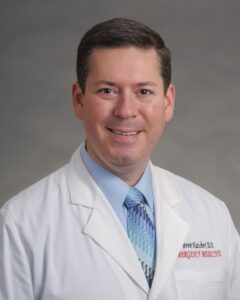How Fellowship Recognition Programs Help Rural Physicians and Their Careers in Emergency Medicine by Dr. D. Brent Hatcher, DO, FAAEP, MBA
 I am currently the fellowship director and assistant medical director of the emergency department at Jackson Madison County General Hospital in Jackson, Tennessee. I have been the fellowship director there since 2016, and I was a fellow of this program in 2010. The program started about 15 years ago with one fellow, and in 2021, I expanded the program to accommodate up to eight fellows. We also have an unopposed family medicine residency associated with the University of Tennessee that hires 12 residents every year. Our main campus emergency room volume is between 80,000-100,000 visits per year.
I am currently the fellowship director and assistant medical director of the emergency department at Jackson Madison County General Hospital in Jackson, Tennessee. I have been the fellowship director there since 2016, and I was a fellow of this program in 2010. The program started about 15 years ago with one fellow, and in 2021, I expanded the program to accommodate up to eight fellows. We also have an unopposed family medicine residency associated with the University of Tennessee that hires 12 residents every year. Our main campus emergency room volume is between 80,000-100,000 visits per year.
Many rural emergency rooms require family medicine physicians with emergency room experience. Depending on your family medicine training, you may not have diverse exposure to emergency medicine. A fellowship program provides an avenue for obtaining broad emergency room experience and perfecting critical procedures that a rural emergency room physician will need to perform. Given that some hospitals have bylaws that require board certification in a chosen field, a fellowship program that makes you eligible for certification can open doors and put you at the top of the list for consideration of employment.
The opportunity to become board certified is important to rural physicians practicing in the emergency department because it demonstrates that they have the knowledge and experience required to achieve board certification. Having a board-certified emergency physician in a rural emergency department gives patients confidence and peace of mind that they are getting the best health care available. In my experience, I have noticed that administrators of rural hospitals love to advertise to the community that there are board-certified physicians working at their institution.
How Fellowship Programs Benefit Patients
Having fellowship-trained physicians in the emergency department benefits patients by providing experienced physicians that are used to stabilizing those who are critically ill. Fellowship-trained physicians have the knowledge base and experience to deliver the best appropriate treatment with the resources available at that facility. The vast knowledge base, procedural experience, and understanding of the referral networks help streamline diagnosis, management, and transfer when required.
American Board of Physician Specialties® Fellowship Programs
The ABPS recognizes emergency medicine fellowships that have been approved by the American Academy of Emergency Physicians (AAEP) Fellowship Recognition Program. Completion of an approved fellowship is one of the criteria for physicians to be eligible to take the certification exam with the Board of Certification in Emergency Medicine (BCEM), which is governed by the ABPS. By completing an AAEP-recognized fellowship, I was able to immediately work in any emergency room in my region. My patient logs and procedural experience spoke for themselves. Becoming board-certified by the ABPS has further secured my ability to practice emergency medicine. I have flexibility when it comes to choosing where I want to work. In fact, most hospitals in my region equally recognize FACEP and FAAEP.
Without a doubt, I would recommend an AAEP-recognized fellowship to any primary care physician planning on working in the emergency department. Whether you want to work full time or supplement your income with part-time shifts, an AAEP-recognized fellowship will give you the confidence to treat anyone who walks through the door. The fellowship provides quick exposure to a vast array of critical medical conditions, comfort with invasive procedures, and affiliation with the nationally recognized ABPS and its network of physicians around the country.






